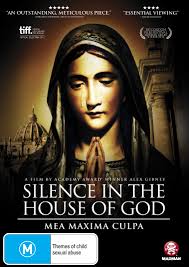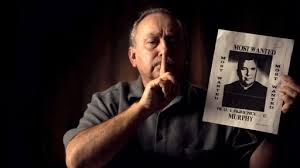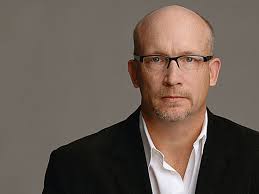Everyone who read my top ten of 2013 list will know that I think Alex Gibney’s Mea Maxima Culpa: Silence in the House of God (2012) is a fantastic although deeply disturbing film. Even though it has already featured on this site in brief, I thought that it was time to expand upon my thoughts on the film with this in-depth review.
Given the film is about the sexual abuse of deaf children in the care of the church, it is no surprising that it is so disturbing. Indeed any film on the subject should be. Many exceptional documentaries will make your blood boil. This one was no different and within two minutes that is how I was feeling. But importantly Gibney never feels the need to resort to cheapness to build this rage inside his viewer. He coaxes it out by simply giving thorough information, from which anyone who sees it could never be anything but pissed off. The fact that the Catholic Church for so long hid behind what were on the on the surface good deeds they were doing, in order to sexually molest young deaf men in their care is such a horrid deceit. Those with the power of the priesthood seemingly had no qualms about using that power in this shameful way. This point is reinforced by Gibney’s choice of experts to speak as well. A former bishop explains how there is a connection between the absurd imposition of celibacy upon Catholic priests and the acting out of abuse. Even more chilling is the fact that many priests who carry out these abuses believe that their inherent goodness or ‘holiness’ outweighs their heinous actins.
Similarly, the basic structures of the Church apparently felt no qualms about covering up the shameful abuses carried out by their supposed brothers in Christ. All these revelations just serve to make the individual instances even more horrifying, if that is even possible. The fact that it is all so systematic, with the covering up of abuse, paying off of victims and absurd attempts to ‘rehabilitate’ offenders through spiritual therapy. If there is a God, that god fucking hates child abuse. It is startling just how far up the chain this all goes. Gibney reveals that former Pope Benedict and the beloved John Paul II were both far from perfect in regards to dealing with paedophilia inside the church. The latter ignored complaints made against one of his most trusted confidants. The film shows the horrors perpetuated by both individuals and systems inside the Catholic Church, but wisely avoids bashing the concept of organised religion wholesale. Don’t get me wrong, there are no punches pulled, but Gibney does not dilute the message of the film by extrapolating the horrors he presents as being symptomatic of a belief in God. He does however attack the systematic covering up of abuses by the Catholic Church and connect that to how the church operates worldwide.
The ‘talking heads’ and infuriating subject matter go a long way to making Mea Maxima Culpa: Silence in the House of God as great a film as it is. However it is also an auteur piece, another example of why Alex Gibney is if not the best cinema documentarian working today, then very close to the top of that list. Probably his most astute decision with this film is to have four of the deaf adult victims of abuse function as talking heads. They sign their testimony, which allows you to feel the raw emotion and lasting effect that the abuse has brought to their lives. Voiceover is used to translate for those of us who don’t read sign and to complement the nuanced signed testimony of the victims. A lesser director would have opted to have the voiceover the focus, perhaps in tandem with re-enactments, but Gibney knows that his approach will deliver the most powerful statement. Another one of the small yet masterful decisions that Gibney makes is with the film’s structure. It starts out specific, opens out to the systematic nature of things and then comes back to the specifics again. This return to specifics at the end is notable, because it is so important that the story of the four men who open up for the film have their entire story told.
Mea Maxima Culpa: Silence in the House of God is a chilling film about the evil that people commit in the world. Detailed, informative, clear, insightful and artistic, as well as an utterly bleak watch that is depressing for your view of the human race, this is not a film that is easy to recommend. But it is a film that everyone should see once.
Verdict: Longneck of Melbourne Bitter
Related beermovie.net articles for you to check out: 2013 in Review: The Top Ten and Worth Watching January 2014 (includes a review of We Steal Secrets).
Like what you read? Then please like Beermovie.net on facebook here and follow me on twitter @beer_movie



Fantastic review, Tim. I’ve long felt that at the core we humans are nothing more than intelligent animals. Copulation is a biological function. To deny that impulse in the guise of religion and expect chastity in men perverts the mind and ultimately the body to where those that perform indecent acts upon the innocent become the norm in cloistered society and perversion breeds perversion. Having said that, there are countless men and women who can go their entire lives with having very little sex or the need to find it. It is a paradox. It’s also popular to bash priests–I’ve known many–I worked at a monastery and they are decent, honorable men who serve God and their community with sincerity. Fascinating topic. 🙂
Cheers Cindy. Really interesting comments. Have you seen this film?
No, I haven’t. But I’ve got it lined up in the Netflix queue because of your review. It was interesting. 🙂
Will be interested to hear your thoughts once you have checked it out.
Fantastic review, Tim. Really looking forward to checking this one out.
You should mate. Tough, but exceptionally good watch.